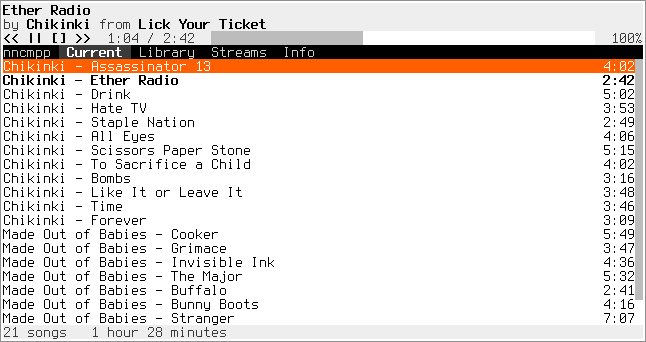There are now up to three bindings per action by default, so grouping is desirable. We can even follow the more or less logical order given by enumeration values. It should be much easier to find what you need.
nncmpp
nncmpp is yet another MPD client. It is in effect a simplified TUI version of Sonata. I had already written a lot of the required code before, so I had the perfect opportunity to get rid of the unmaintained Python application and make the first TUI client that doesn’t feel awkward to use.
If it’s not obvious enough, the name is a pun on all those ridiculous client names, and should be pronounced as "nincompoop".
Features
Packages
Regular releases are sporadic. git master should be stable enough. You can get a package with the latest development version from Archlinux’s AUR, or from openSUSE Build Service for the rest of mainstream distributions. Consult the list of repositories and their respective links at:
Building and Running
Build dependencies: CMake, pkg-config, help2man, liberty (included),
termo (included)
Runtime dependencies: ncursesw, libunistring, cURL
$ git clone --recursive https://github.com/pjanouch/nncmpp.git $ mkdir nncmpp/build $ cd nncmpp/build $ cmake .. -DCMAKE_INSTALL_PREFIX=/usr -DCMAKE_BUILD_TYPE=Debug $ make
To install the application, you can do either the usual:
# make install
Or you can try telling CMake to make a package for you. For Debian it is:
$ cpack -G DEB # dpkg -i nncmpp-*.deb
Note that for versions of CMake before 2.8.9, you need to prefix cpack with
fakeroot or file ownership will end up wrong.
Having the program installed, create a configuration file and run it.
Configuration
Create ~/.config/nncmpp/nncmpp.conf with contents like the following:
settings = {
address = "localhost:6600"
password = "<your password>"
root = "~/Music"
}
colors = {
normal = ""
highlight = "bold"
elapsed = "reverse"
remains = "ul"
tab_bar = "reverse"
tab_active = "ul"
even = ""
odd = ""
selection = "reverse"
scrollbar = ""
}
streams = {
"dnbradio.com" = "http://www.dnbradio.com/hi.m3u"
"BassDrive.com" = "http://bassdrive.com/v2/streams/BassDrive.pls"
}
Terminal caveats
This application aspires to be as close to a GUI as possible. It expects you to use the mouse (though it’s not required). Terminals are, however, somewhat tricky to get consistent results on, so be aware of the following:
-
use a UTF-8 locale to get finer resolution progress bars and scrollbars
-
Xterm needs
XTerm*metaSendsEscape: truefor the default bindings to work -
urxvt’s vtwheel plugin sabotages scrolling
Contributing and Support
Use this project’s GitHub to report any bugs, request features, or submit pull requests. If you want to discuss this project, or maybe just hang out with the developer, feel free to join me at irc://irc.janouch.name, channel #dev.
Bitcoin donations: 12r5uEWEgcHC46xd64tt3hHt9EUvYYDHe9
License
nncmpp is written by Přemysl Janouch <p.janouch@gmail.com>.
You may use the software under the terms of the ISC license, the text of which is included within the package, or, at your option, you may relicense the work under the MIT or the Modified BSD License, as listed at the following site:
